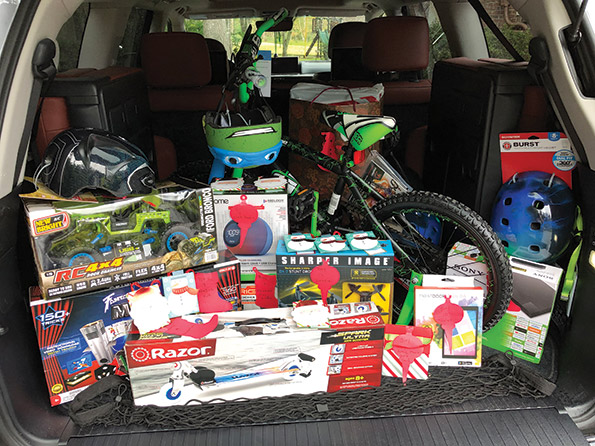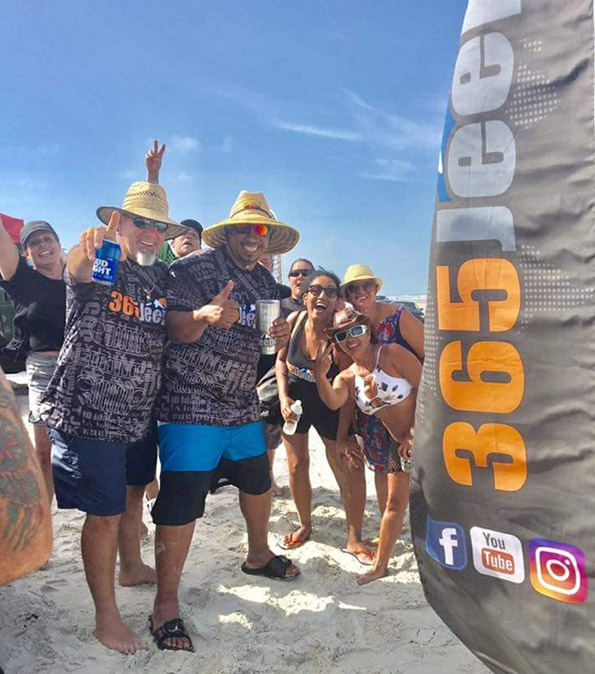 Adversity often brings out the best in people, and Jeepers are no exception. Central Florida law enforcement agencies have long relied on volunteers from the off-road ranks to assist in search-and-rescue missions and disaster relief. Among the more active and experienced are Coty Byers, president of Tampa’s Blackwater Jeepers, and David Gesualdo, the publisher of this magazine. When Hurricane Harvey made landfall on Texas’ Gulf Coast in August 2017, Byers helped lead a convoy of Jeeps, donated U-Hauls, Byers’ tractor-trailer and an SUV from Tampa to Vidor, Texas, ferrying several tons of supplies to grateful Houston-area residents.
Adversity often brings out the best in people, and Jeepers are no exception. Central Florida law enforcement agencies have long relied on volunteers from the off-road ranks to assist in search-and-rescue missions and disaster relief. Among the more active and experienced are Coty Byers, president of Tampa’s Blackwater Jeepers, and David Gesualdo, the publisher of this magazine. When Hurricane Harvey made landfall on Texas’ Gulf Coast in August 2017, Byers helped lead a convoy of Jeeps, donated U-Hauls, Byers’ tractor-trailer and an SUV from Tampa to Vidor, Texas, ferrying several tons of supplies to grateful Houston-area residents.
“On that original mission to Texas, once we got out there, we realized there was a gap between the big government agencies coordinating the response and the people who needed help,” Byers says. “It didn’t matter if they were rich or poor. They all had the same basic needs. We brought all this stuff, and we’re handing it out, and the FEMA trailers were still locked up.”
Harvey proved to be a turning point. Since that first convoy, whenever a major disaster has struck, Central Florida Jeep groups have risen to the occasion. From Hurricane Irma in South Florida to Florence in North Carolina and Michael in the Florida panhandle, Jeepers have completed a total of 10 disaster-relief missions with convoys as long as 34 vehicles.
Byers says it’s the many volunteers who have bought, collected and transported all those supplies who deserve the credit — particularly those who made possible the trip to the panhandle, which was struck by Michael just weeks after Florence abated.
“We actually found out about Michael right after the run up to North Carolina for Florence. People were still resting and getting ready to go back to work,” Byers says. “We just kicked right back into rescue mode.”
It is in that spirit that the Central Florida Jeep Response Team was formed in November. The team includes representatives from each of the Jeep groups that have participated in the relief missions, and its leaders have ambitious plans for 2019.

delivered by the JRT to local shelters.
We Can Do More
Jeepin’ magazine has been the Central Florida Jeep Response Team’s financial backer, having funded the purchase of a medium tactical vehicle, military-grade trailers, generators, gas, food, water and other supplies. Gesualdo, who has personally participated in each of the hurricane missions, says he was inspired by the grit and determination his fellow volunteers showed on every mission, including his brother, Eric, an experienced search-and-rescue volunteer and now one of the leaders of the Jeep Response Team.
Starting this year, the JRT will also coordinate local missions following the additions of search-and-rescue and rapid-response teams.
“We just felt we could do more,” Gesualdo says. “We’re in touch with so many groups, and their members are always asking how they can make a difference. As the law enforcement-affiliated teams have proven, Jeepers are uniquely equipped for this incredibly challenging and fulfilling work.”
Prospective volunteers are invited to visit Jeepin-USA.com/JRT to learn more about the teams and what will be asked of their members. Reflecting on the relief missions his group and others have completed to this point, Byers says he has come to realize it’s “almost a sense of duty” that compels Jeepers to give of their time and energy to help those in need.
“These are just generous, good people. When other vehicles get stuck, Jeepers start going in and pulling people out,” Byers says. “It’s almost a sense of duty. Good people tend to buy Jeeps.”
Nuts and Bolts
The Central Florida Jeep Response Team is made up of local volunteers from the Jeepin’ community. Prospective volunteers are invited to visit Jeepin-USA.com/JRT to learn more about the teams and what will be asked of their members.






 Concerns of Police Survivors is an organization that was started in 1984 by a woman named Suzie Sawyer, after her husband was killed in the line of duty. Her mission in starting the program was to help surviving families and co-workers cope after the loss of a loved one. Among other things, COPS addresses the emotional, financial and legal needs of families; provides training to law enforcement agencies on survivor victimization issues; and provides public outreach and awareness on behalf of law enforcement and the families of fallen officers.
Concerns of Police Survivors is an organization that was started in 1984 by a woman named Suzie Sawyer, after her husband was killed in the line of duty. Her mission in starting the program was to help surviving families and co-workers cope after the loss of a loved one. Among other things, COPS addresses the emotional, financial and legal needs of families; provides training to law enforcement agencies on survivor victimization issues; and provides public outreach and awareness on behalf of law enforcement and the families of fallen officers. 







